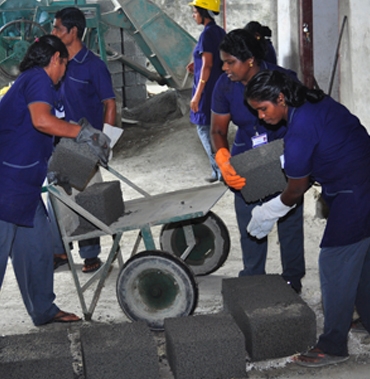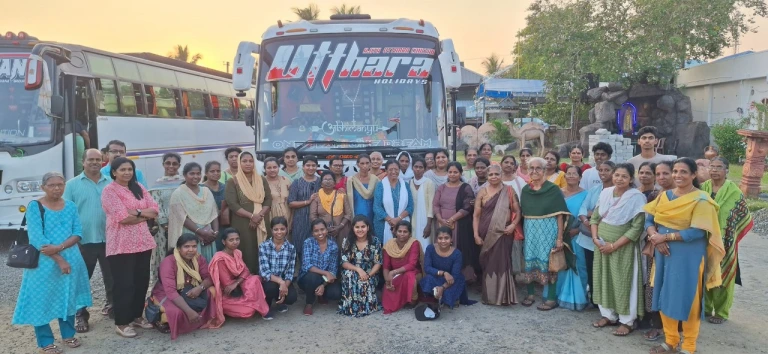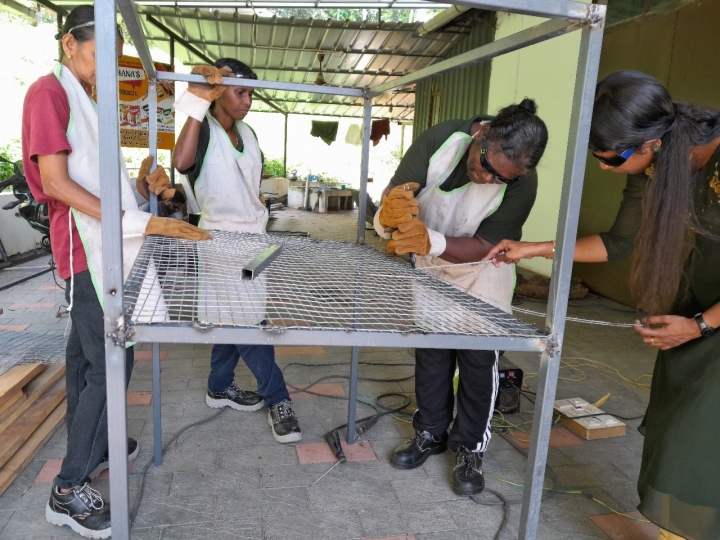Written by NHRF's consultant in India, Anita Cheria, with inputs from the AWC team. The pictures featured are all AWC’s women at work. Article is edited by Winnu. This blog was originally published here.
An Experience of Archana Women’s Centre
Mercy, aged 42, a welder and mother of two, when asked about her work, is quick to respond, “My work and worker identity fills me with pride and confidence.” This is not an answer easy to come by, as a large percentage of Indian workers in the informal sector face insecure employment, and far from ideal working conditions. Mercy is a member of Ettumanoor Vanitha Labour Contract Co-operative Society, the first all women labour contract society in the state of Kerala. The cooperative is an initiative of the Archana Women’s Centre (AWC).
While Mercy’s life is not easy, it certainly has its perks. Her day starts with a rush of housework, and then she takes a bus to the welding workshop, she shares with her colleagues Anita, Geetha and Thankamma. She returns home with her daily income of Rs.800 after her eight-hour working day, from 9am-5pm. Right now, her income, like that of her team-mates is based on a contract to build bottle booths, structures used to collect waste plastic bottles, avoid littering and support recycling plastic waste. They have previously made chicken coops based on orders from the NGO confederation and sixteen Material Collection Facilities ordered for waste management system for Nedumkunnam Panchayat.
"A workplace free of fear and where one can share opinion, is certainly precious." Mercy
Mercy shared, “Welding is well paying. Working outside the cooperative may add a few hundreds to my daily wage temporarily, but it can’t match the collective strength and solidarity, respect and good working conditions I enjoy as a member of labour co-operative. A workplace free of fear and where one can share opinion, is certainly precious.”
She went on to say that, “ Welding was something I feared, but my trainer gave me big support. Over time I learnt many aspects about my work.” She learnt about what precautions of to take against exposure to excessive heat, to handle the tools carefully and to work as a team.
Experimenting and exploring collective income options for women has been the core of the efforts of AWC. Mercy’s first training at AWC was in Bamboo Technology. This was based on the findings that bamboo as a building material was both cost effective and durable. Soon after the 2018 floods in Kerala she was part of a project that made five bamboo shelters. The training was intensive however the sourcing of material and getting orders turned out to be difficult, and so this work could not be sustained. But then neither did the AWC team or workers give up. Assessing the potential of the workers, they were next trained in welding. While iron welding is common and pays well, it is a male dominated field. Mercy is part of one of the rare, if not the first women’s team of welders with their own workshop in the region. They undertake government contracts and earn a sustained income throughout the year.
Mercy takes pride in the fact that she could get a washing machine for her home, and is able to fulfil requests from her children. But what she values most, is the freedom of not having to ask before she spends. She says that now if she feels like helping a friend, by giving Rs.100 or more , she does it with a sense of freedom. Her four year association with AWC has been life changing. She has security and stability and is able to save Rs.100 everyday. She is hopeful about her future.
Many lives changed
There are many stories like Mercy’s among women who are members of the Ettumanoor Vanitha Labour Contract Cooperative Society. Through this cooperative and its other initiatives the AWC has directly affected the lives of approximately 11000 women spread over 4 districts, and many more indirectly.
AWC is led by Thressiamma Mathew and supported by a dedicated, skilled team. They have made consistent innovative efforts over the last two decades to empower women. Their aim has been to ensure equality of rights, pay, opportunities and freedom for women.
"The power differential and, the tendency to exploit, mirrored the patriarchal norms in our society".
Thressiamma was inspired to start AWC due to her earlier experience of working on a government programme of water supply and sanitation. She realised that though work was plenty, women were only employed as helpers, while men were employed as master masons or assistants. The male helper was paid Rs.50, while the female got Rs.25, though the target was the same for both. The master mason, all male, is the contractor and got Rs.400 per toilet constructed. This disparity in wages based on gender was disturbing to Thressiamma, though the issue did not seem to bother others. The power differential and, the tendency to exploit, mirrored the patriarchal norms in our society. That’s when she came up with a plan to change this situation. She decided that the surest way to bring a change was to train women as master masons. Easier said than done!

Thus began an arduous journey of changing mindsets of both men and women, of customers and government, of testing the market for women workers and entrepreneurs. After several efforts, the first batch of women master masons completed their training. The idea was that women/women workers can be empowered through skills and collectivization and work in teams as small self-led collectives. Starting with registered societies of skilled workers, they institutionalised systems and processes ensuring social security, pension and insurance. They have been pioneers in co-creating ideal work spaces for workers. The Jeevapoorna Women Masons Society (JEEWOMS),the first collective that Thressiamma initiated, was registered at Thrissur in 1995 and continues to function even today.
Archana Women’s Centre has many firsts to its credit. it facilitated the registration of MASO CARPE, the first ever women contractor’s society of masons and carpenters. It demonstrated women’s ability to enter unconventional areas of work.

AWC also created a labour bank , in which forty-two skilled women workers(masons, carpenters, electricians, plumbers, grass cutters etc.) were registered as a society. Their services are used under LIFE (project of state government) and flood relief house construction. During the pandemic they worked at Aymanam and Thalayolaparambu Grama Panchayaths. After the registration procedure as a society, they qualified to get contract from the local government and from the private sector. AWC also initiated social marketing and introduced enterprise resource planning in the community groups they work with.
According to Thressiamma, the main challenge is how to release women from the patriarchal mindset and then developing the feeling ‘I can’. The rest is simpler, skills can be learnt, support can be provided. The training that AWC provides its women is holistic- building organizing skills and employability, working on attitudinal changes and increasing self-awareness. They create opportunities for women to share their opinion and aspirations. The women are trained in practical skills like how use of computers, karate for self-defense, digital skills, basic financial accounting, how to file a legal case. They are also trained in soft skills like how to attend a phone call and to making welcome speeches. They are encouraged to pass on these skills and empower more women.
While there is no one formula, the attempt is to build confidence, potential for livelihood , skills and improve mobility. AWC hopes that this provides a basket of opportunities that add up for women in their personal and professional life. The women’s testimonials are evidence of a clear impact. Anithamol who got trained in taxi and two-wheeler driving says, “I got back the smile that I had before marriage- after a series of trainings and exposure provided by the AWC team. The biggest change for me was the experience of driving the taxi. This was big. My children too are excited by my work”
Some of the women attributed their new confidence partly to the self-defense. One participant says, ”Now there is no fear, I am not scared to travel at night. Before this I never ventured out after dark! Now I feel I can collapse a person double my size. I have the freedom and confidence to travel."
AWC has played a pioneering role in demonstrating a holistic approach to women’s empowerment by addressing financial independence, along with emotional, social and physical empowerment. They have demonstrated the revolutionary changes that collectivization and financial independence can make in the lives of women.
“Labour contract cooperative societies have a big advantage, it makes workers more competitive when it comes to bidding for contracts". Aryamol
Aryamol who led the two year process of registering the Ettumanoor Vanitha Labour Contract Co-operative society says, “Labour contract cooperative societies have a big advantage, it makes workers more competitive when it comes to bidding for contracts. As a Labour co-operative Society categorised D,(the categorization new cooperatives initially get) we are eligible to take up a single work of up to 50 lakhs. As of now our co-operative society has four ongoing contract works, 9 lakhs worth welding works, and two building works. Once we finish one crore worth of work, we can get a price certificate, and this will make us even more competitive. We will be eligible to get an advance payment of 25% of the contract amount in all government works”. The path ahead is clearly mapped out by the team, there is no going back!

